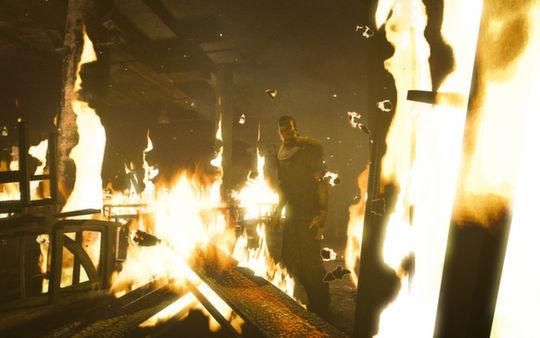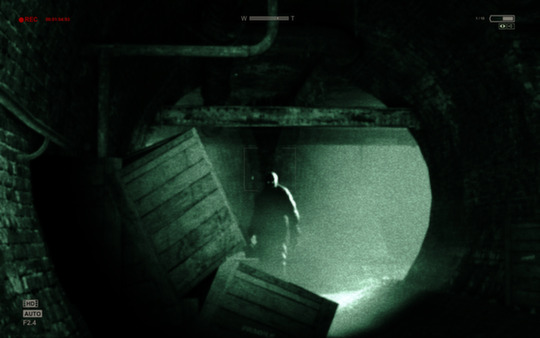Because you enjoy being chased by two nude guys with machetes.
Fear is a strange emotion to manipulate with a video game. It requires setting up the right environment and the right gameplay to best immerse the player in the spooks. We speak of immersion for all kinds of games, but for the horror genre, it’s an absolute necessity. Otherwise, like many of the shoddy horror movies that hit major theaters, you end up with an inane plot that doesn’t bode well under scrutiny. Outlast manages to straddle that immersion line often successfully, but when it doesn’t, you're totally dropped out of the experience.
Enter Miles Upshur, an investigative reporter who receives an anonymous tip about the objectionable practices at Mount Massive Asylum. Once closed down by the government, it reopened in recent years thanks to the supposedly charitable efforts of an organization, Murkoff. Miles finds himself navigating the asylum armed only with a camcorder, unaware of the grave danger he’s in. He really should have turned back at the first sign of a problem.
The camcorder is used to record events as they happen in Outlast, which miraculously adds notes to Miles’ notebook in an instant. The game is quick to remind you that Miles won’t take notes if he isn't using the camcorder, and given that he is a transcendent platformer while holding it, it’s any wonder why developers Red Barrel bother letting the player toggle it on or off. It could’ve easily been the default, much like Paranormal Activity’s gimmick.
On the upside the camcorder shtick comes complete with a night-vision mode. Mount Massive Asylum has a lot of poorly lit hallways and rooms for Miles to navigate, and it is literally impossible without the camcorder in front of his face. While recording doesn’t use up batteries at all (because video games), night vision does at a deliberate pace.
A handful of times I became seriously concerned with running out of batteries, but I thankfully never did. The tension of hearing the low battery beep while still in complete darkness is authentically worrisome, and I held my breath while replacing them in the dark, not knowing what would be there when I lifted the camcorder back up. Players who are less diligent about checking optional rooms and hallways may have more frightful experiences, though.

Of course, it’s important to know what awaits players in the dark. Obviously, there are more than a handful of asylum patients waiting to kill you just for being you. Some, such as the hulking brute Walker, and the surprisingly naked Twins, characterize your experience with terror and taunting, resulting in unnerving chase sequences down unfamiliar hallways lit only by your limited night vision. Without any way to defend yourself, getting caught is not an option.
Although the gore and viscera strewn about Mount Massive’s walls establish a convincingly gross environment, it is these encounters instill fear. Some patients don’t flip out on you right away, and ticking bombs are hard to distinguish before it’s too late. Save for a few instances, it is honestly hard to discern just when you’ll have to hide or run for your life.
Those immersion-breaking instances generally happen when completing menial tasks, like turning valves to drain a pathway or turning valves to turn on a sprinkler system. Patrolling enemies’ pathways are somewhat randomized, but you can usually depend on enemies showing up as soon as you accomplish something. Despite the stress of sneaking around them, watching them walk into a room over and over and just stare into the open space only makes their feeble AI more prevalent. You find yourself trying to beat a game more than trying to escape a person. Of course, the moments when they can magically see you in the dark are more frustrating than actually getting locked up in an asylum.

That’s basically all there is to Outlast: Sometimes it’s a haunting quest through your own fear tolerance, and sometimes it’s just a game. Despite the latter, I did enjoy going deeper into the shared mania of the patients as Miles tries desperately to escape. It’s the narrative that eventually impedes all that good scary fun for me. I don’t want to ruin anything, even months after its PC release, but just know that this horror story tries a little too hard. Those efforts end completely in vain as the confusing final chapter undoes anything the story had going for it. The bitter taste in my mouth was more than just blood.
Outlast came out on the PC last year, and this is the PS4 port we’re discussing now. The only apparent difference I noticed was that the PC has better graphics. If that’s surprising, I don’t know what to tell you. This doesn’t look like a leap in graphics technology from the last generation, particularly with muddied textures on enemies up close. However, I will defend that the night vision is one of the coolest effects in games, deftly lending to moments of lonely terror.
Oh, and the touch pad can be used to zoom the camcorder in and out. Shoehorn!
If you already own the PC version, there is absolutely zero reason to purchase this again. On the other hand, Sony is releasing it for free for PS members right off the bat, which is a tough price to argue down. Even if you are wont to spend money on games, this is by no means a bad investment. Outlast is not the most satisfying horror experience around, but it had my heart thumping and my head throbbing enough to make it a worthwhile trip.
Code provided by publisher. Based on PS4 version. Also available on PC.
-
Authentically scary moments
-
... undone by game-y moments
-
Night vision mode is awesome/terrifying
-
Graphics don't match PC original
-
Mediocre story unravels completely at the end







